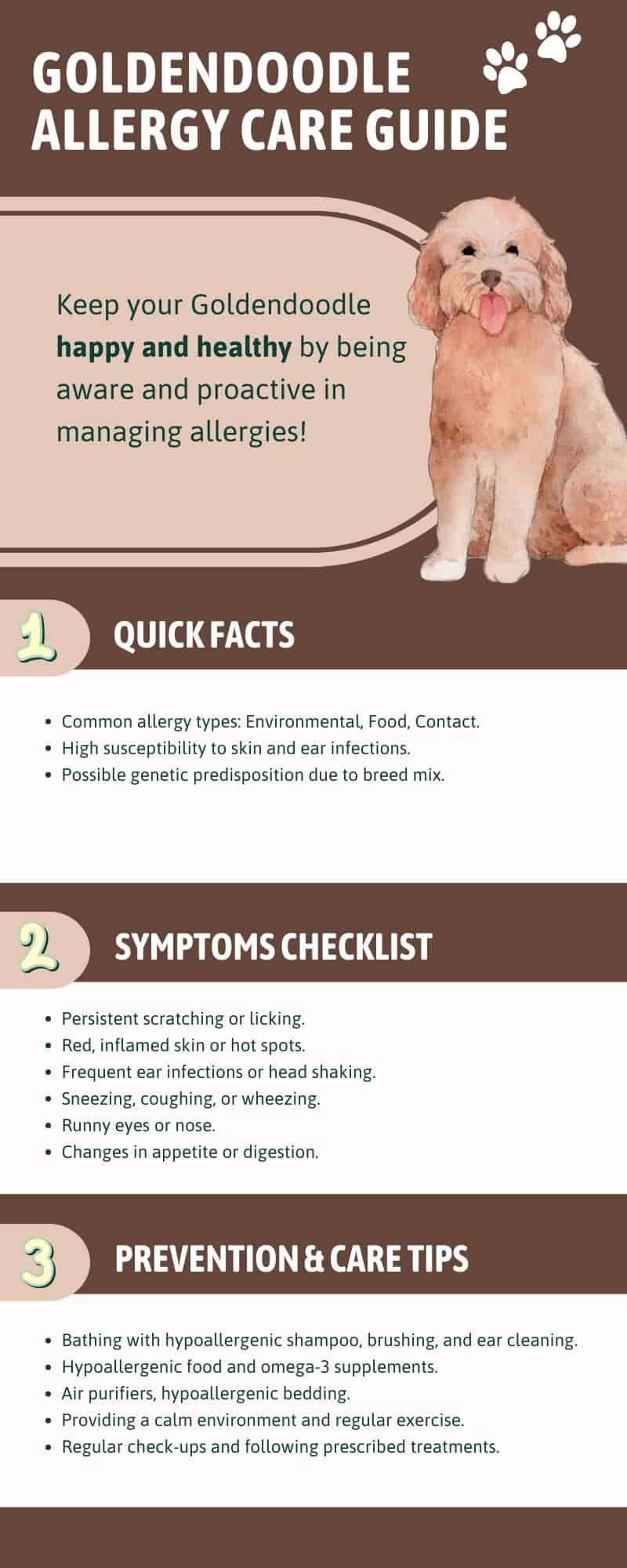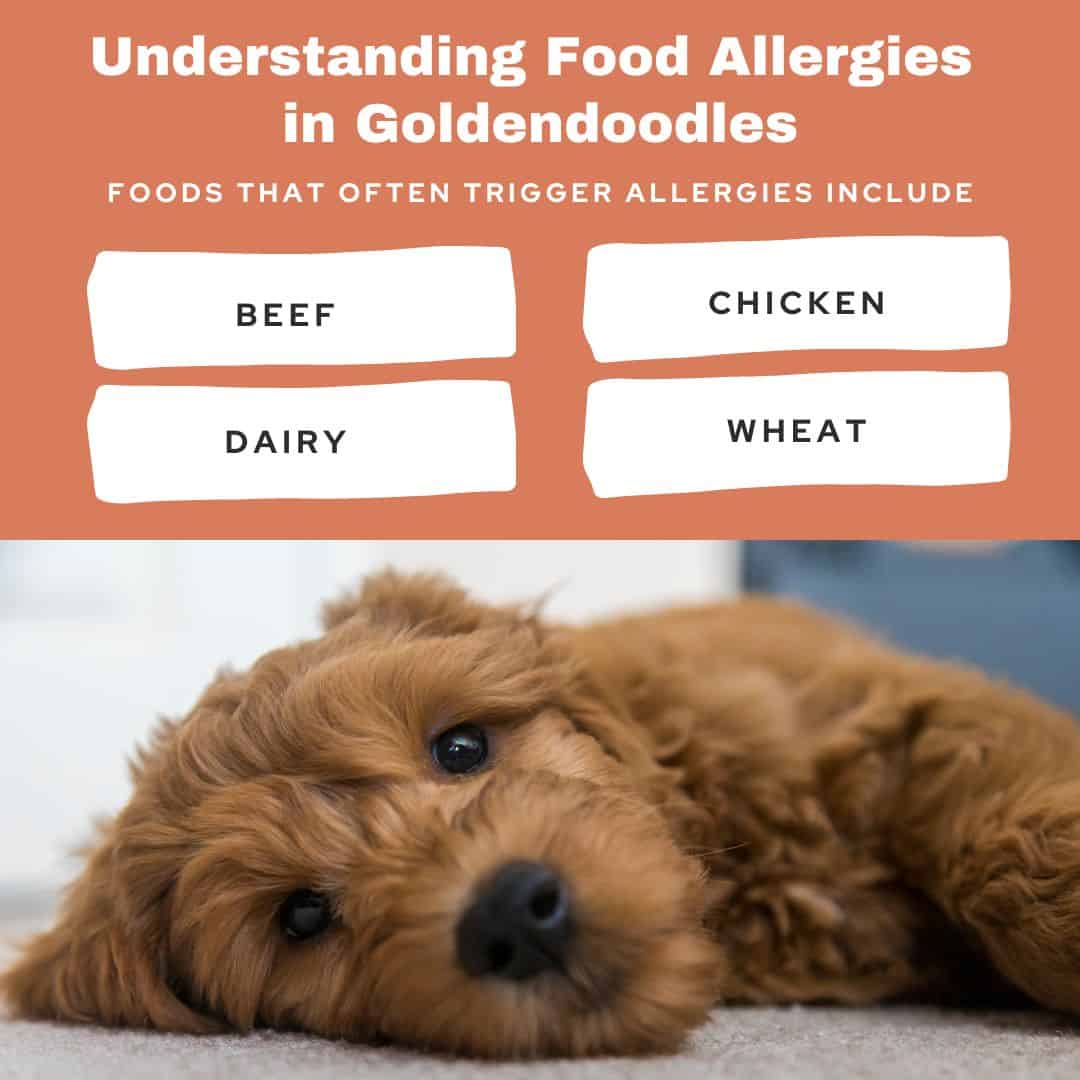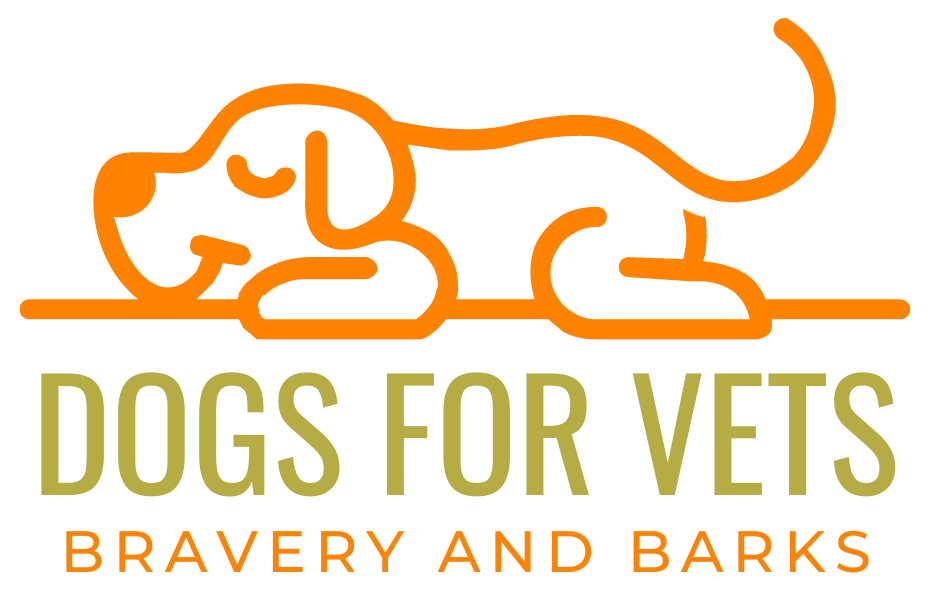This post may contain ads and affiliate links and we may earn a small commission when you click on the links at no additional cost to you. As an Amazon Affiliate, we earn from qualifying purchases. You can read our full disclaimer here.
Goldendoodle Allergies: Unlock the Secrets to Your Dog’s Health

Goldendoodle allergies can be a puzzling aspect of owning this adorable hybrid breed.
Goldendoodles, a charming mix of Golden Retriever and Poodle, have rapidly become one of the most beloved dog breeds. Known for their intelligence, friendly nature, and often hypoallergenic coats, they seem like the perfect pet.
However, like any breed, they come with their own set of challenges, allergies being a notable one.
In this post, I’ll share insights from my own journey with my 10-year-old Goldendoodle who battles itchy feet due to allergies. Through our story, you’ll discover the common types of allergies in Goldendoodles, how to spot them, and ways to provide relief and care.

Whether you’re a prospective Goldendoodle owner or already have one as part of your family, understanding these allergies is key to ensuring a happy, healthy life for your furry friend.
Goldendoodle Allergies: Types and How to Identify Them
Understanding the different types of allergies in Goldendoodles is essential for their health and well-being. These delightful dogs are prone to various allergies, each with distinct triggers and symptoms.
By recognizing and comprehending these allergies, owners can take proactive measures for effective management and treatment.
Environmental Allergies
Environmental allergies, or atopic dermatitis, are prevalent in Goldendoodles. These are reactions to everyday substances in their surroundings. Common triggers include:
- Pollen from trees, grasses, and flowers
- Mold spores
- Dust mites
- Grass
Symptoms usually include itchy skin, particularly around the paws, face, and belly. In some cases, respiratory symptoms like sneezing or wheezing can occur, though they are less common.
Regular grooming and maintaining a clean living environment can help minimize exposure to these allergens.
Food Allergies

Food allergies in Goldendoodles are immune responses to certain food ingredients mistakenly identified as harmful. Typical culprits include:
- Beef
- Chicken
- Dairy products
- Wheat
These allergies can cause skin irritations (such as hives and itching) and gastrointestinal issues (like vomiting and diarrhea). Identifying food allergies often involves an elimination diet, conducted under a veterinarian’s supervision, to monitor your dog’s reaction to newly introduced foods.
Contact Allergies
Contact allergies occur when a Goldendoodle’s skin reacts to direct contact with an allergen. These allergens can vary widely, but some common ones are:
- Certain fabrics (like wool or synthetic fibers)
- Rubber and plastic materials
- Cleaning products
- Specific plants
Symptoms are usually localized skin reactions, such as redness, itching, or swelling, particularly in areas with less fur coverage.
Identifying and eliminating the allergen source and providing soothing skin treatments are crucial steps in managing contact allergies.
Recognizing the Signs of Allergies in Your Goldendoodle
Early recognition of allergy symptoms is key to managing and treating them effectively. Common signs to watch for include:
- Persistent itching and scratching
- Red or inflamed skin
- Frequent ear infections
- Gastrointestinal distress
For example, my own Goldendoodle often licked his paws, a clear sign of discomfort and a common response to allergies.
Regular vet consultations and attentiveness to these symptoms can guide appropriate steps to alleviate your pet’s discomfort, which may involve dietary changes, medications, or changes in their environment.
Remember, each dog is unique, and a solution that works for one might not work for another. Patience and careful observation are essential in finding the right approach to manage your Goldendoodle’s allergies.
Diagnosing Allergies in Goldendoodles
The Crucial Role of Veterinary Diagnosis
When it comes to identifying allergies in Goldendoodles, the role of a professional veterinary diagnosis cannot be overstated.
Allergies can present symptoms similar to other health issues, making accurate identification challenging without expert input.
A veterinarian can not only help in pinpointing the exact allergy but also in devising an appropriate treatment plan. This step is vital because an incorrect diagnosis can lead to ineffective treatments, further discomfort for your dog, and potentially worsening the underlying condition.
Common Tests for Allergy Diagnosis in Dogs
Several tests are commonly used to diagnose allergies in dogs, including:
- Skin Testing (Intradermal Testing): This involves injecting small amounts of allergens into the dog’s skin to observe for reactions. It’s especially useful for diagnosing environmental allergies.
- Blood Testing (Serology): These tests check for antibodies to specific allergens in the dog’s blood. They are less invasive than skin tests but can be less accurate in some cases.
- Elimination Diet Trials: Particularly for food allergies, vets may recommend an elimination diet. This process involves feeding the dog a diet with limited ingredients until symptoms improve, then gradually reintroducing potential allergens to identify the trigger.
Comprehensive Treatment Approaches for Goldendoodle Allergies
Dealing with allergies in Goldendoodles requires a well-rounded approach that includes medical treatments, lifestyle changes, and dietary adjustments.
Each of these components plays a vital role in alleviating your dog’s discomfort and improving their quality of life.
Medical Treatments for Allergy Relief
Effective management of allergies often begins with medical interventions. These treatments are tailored to address the severity and type of the allergy, providing relief from symptoms and preventing complications.
- Antihistamines: Used to reduce itching and other allergic reactions. Finding the right antihistamine may involve some experimentation, as different dogs respond differently to various medications.
- Corticosteroids: These are powerful anti-inflammatory drugs that can relieve severe allergy symptoms. Due to potential side effects, they are typically used for short-term relief.
- Topical Treatments: Including medicated shampoos and creams, these are applied directly to the skin to soothe irritation and inflammation.
- Immunotherapy: Allergy shots can be a long-term solution for chronic environmental allergies, gradually reducing sensitivity to specific allergens.
Lifestyle Modifications for Allergy Management
Adjusting your Goldendoodle’s lifestyle is crucial in reducing exposure to allergens and minimizing allergic reactions.
- Allergen Avoidance: Identifying and avoiding known allergens is key. This may involve changes in your dog’s outdoor activities or modifications to your home environment.
- Regular Grooming: Bathing your dog with hypoallergenic or medicated shampoos can help remove surface allergens and soothe irritated skin.
- Creating an Allergy-Safe Environment: Using hypoallergenic bedding and avoiding certain household products can help reduce your dog’s exposure to allergens.
Dietary Adjustments for Optimal Health
Diet plays a significant role in managing allergies. The right diet can strengthen your dog’s immune system and reduce allergic reactions.
- Hypoallergenic Diets: These diets use novel protein sources or hydrolyzed proteins to minimize allergic reactions.
- Supplements: Omega-3 fatty acids and probiotics can support skin health and improve digestive function, respectively.
Personal Experience in Managing My Goldendoodle’s Allergies
Through trial and error, we found effective ways to manage my Goldendoodle’s allergies. One key change was switching his diet to Purina Pro Plan Sensitive Stomach (salmon and rice) dog food. This shift made a noticeable difference in his overall comfort and skin health.
Fortified with live probiotics, it boosts digestive and immune health. Previously known as FOCUS Sensitive Skin and Stomach, its sunflower oil, rich in omega-6, promotes a healthy skin and coat.
Additionally, regular Cytopoint injections, administered every two or three months, have been instrumental in keeping his allergies under control. These injections specifically target itchiness and have been a game-changer in his allergy management routine.
Consistency in these treatments, alongside regular vet check-ups, has helped us effectively manage his symptoms and improve his quality of life.
Treating and managing Goldendoodle allergies involves a multifaceted approach. It’s about finding the right balance of medical treatments, lifestyle changes, and dietary adjustments.
Each dog’s needs can differ, so it’s important to work closely with your veterinarian to develop a personalized plan for your pet.
Proactive Strategies to Reduce Allergy Risks
Preventing allergies in Goldendoodles starts with understanding the potential triggers and taking proactive steps to minimize their exposure.
While it’s impossible to completely eliminate the risk of allergies, certain measures can significantly reduce their likelihood and severity.
Regular Grooming and Its Benefits
Regular grooming is not just about keeping your Goldendoodle looking great; it’s a vital part of maintaining their health, especially for those with allergies.
- Frequent Baths: Using hypoallergenic or medicated shampoos can help remove allergens from the fur and skin, reducing the chance of allergic reactions.
- Brushing: Regular brushing keeps the coat free of tangles and helps to distribute natural oils, which protect the skin.
- Ear Care: Since Goldendoodles are prone to ear infections, regular ear cleaning is essential, especially for those with allergies.
The Role of Diet in Allergy Prevention
A well-balanced diet is crucial for overall health and can play a significant role in preventing allergies.
- High-Quality Ingredients: Feeding your Goldendoodle a diet made with high-quality ingredients can help strengthen their immune system.
- Avoiding Allergens: If your dog has known food allergies, it’s important to avoid those ingredients in their diet.
- Supplements: Certain supplements, like omega-3 fatty acids, can help improve skin health and reduce the likelihood of allergic reactions.
Lifestyle Adjustments for a Healthier Goldendoodle
A healthy lifestyle goes a long way in minimizing the risk and impact of allergies.
- Exercise: Regular exercise helps maintain a healthy weight and strengthens the immune system.
- Allergen-Free Environment: Keeping your home clean and free of known allergens can significantly reduce the risk of allergic reactions.
- Stress Reduction: Stress can exacerbate allergies, so providing a calm and stable environment is important for your Goldendoodle’s well-being.
By integrating these preventative measures and care practices into your Goldendoodle’s routine, you can significantly reduce the risk of allergies and ensure a happier, healthier life for your furry companion.
Regular grooming, a well-managed diet, and a healthy lifestyle are key components in this ongoing effort.
Adapting to Life with Your Goldendoodle’s Allergies
Living with a Goldendoodle who has allergies is a journey filled with learning and adaptation. It’s about understanding their needs and making adjustments to ensure their comfort and happiness.
Daily Management and Routine Adjustments
Effective allergy management in Goldendoodles involves daily observation and sometimes changes in your daily routine:
- Routine Monitoring: Keep a close eye on how your dog responds to different environments and adapt as necessary.
- Consistency in Treatment: Adhering to the treatment plan, be it medication, diet, or grooming, is crucial for managing allergies.
- Environmental Adjustments: Making your home allergy-friendly can significantly reduce your dog’s allergy symptoms. This includes using air purifiers, choosing hypoallergenic bedding, and reducing the use of strong fragrances or chemicals.
Emotional Support and Understanding
The emotional well-being of a Goldendoodle with allergies is as important as their physical health:
- Comfort and Reassurance: Provide extra comfort during allergy flare-ups, as a calm presence can greatly ease their stress.
- Patience: Understand that living with allergies can be stressful for your dog. Being patient and empathetic is key.
- Bonding Activities: Regular, gentle activities can strengthen your bond and provide positive experiences for your dog.
The Importance of a Supportive Community
Having a network of support is invaluable for anyone caring for a Goldendoodle with allergies:
- Sharing Experiences: Connect with other Goldendoodle owners who have similar experiences. They can offer advice and support.
- Staying Informed: Keep up to date with the latest in dog allergy care and treatments, through veterinary blogs, websites, or forums.
- Regular Veterinary Care: Regular check-ups with your veterinarian are vital. They provide expert medical advice and guidance in managing your dog’s allergies.
Navigating life with an allergic Goldendoodle has its challenges, but it’s also filled with moments of growth and joy. It’s a path that teaches empathy, care, and adaptability.
With the right care and adjustments, you can ensure a comfortable and happy life for your Goldendoodle, allergies notwithstanding.
Final Thoughts on Goldendoodle Allergies
In conclusion, understanding and managing Goldendoodle allergies is a crucial aspect of caring for this breed. Regular veterinary care, appropriate dietary choices, consistent grooming, and environmental adjustments are key to keeping your Goldendoodle comfortable.
While allergies can be challenging, with patience and proper management, your Goldendoodle can lead a happy, healthy life. This journey not only enhances the well-being of your furry friend but also strengthens the bond you share with them.
-

Coffee Mug – In Dog Coffees I’ve Only Had One
Price range: $11.95 through $14.95 Select options This product has multiple variants. The options may be chosen on the product page

